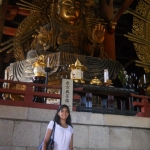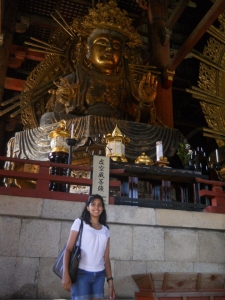| Major(s) | Psychology |
| Hobbies | Hiking, reading, horseback riding, playing taiko |
| Hometown | Mercer Island, Washington |
| Program/Study Site | CET: Osaka, Japan, (Osaka Gakuin University) |

Why study abroad?
I knew I wanted to study abroad before I ever came to Scripps. Although I've done a fair amount of international traveling to visit my family in India, I'd never had the opportunity to go somewhere independently and of my own choice. I knew that study abroad was going to be my best chance to have that experience.
Why did you choose Japan?
I had a very close friend and neighbor who moved to Tokyo when we were both young, and my family went to visit hers for a week when I was seven. At that age, I found Japan to be different enough to be disconcerting, and since then I've always thought that I wanted to go back and see it again once I was old enough to experience it properly. I've also had a long-standing fascination with Japanese history and culture, and I wanted to engage in those interests first-hand.What courses did you enroll in while abroad?
Intensive Japanese II was my only required course, but I took Japanese Pop Culture, Japanese Psychotherapies, and History of Fine Art in Japan as electives.What was your living situation?
I lived in a house approximately 10-15 minutes away from the university by bike (one station by train). Each foreign student was paired up with a local university student, so each house had an even number of American and Japanese students. In my house, there were six of us in total – we each had our own rooms, but we shared two bathrooms plus a small common area, which was great for getting to know each other during our down time! In addition, there was another house with some of our program-mates less than a block away, so we frequently all got together to study or hang out.What did you do for fun?
I did a little bit of everything: I shopped in Tokyo, ate beef in Kobe, saw deer in Nara, hiked in the mountains around Kyoto, and visited Osaka's massive aquarium. Mostly, though, I visited temples and shrines all around the Kyoto-Osaka region, and I went to onsen, or bathhouses, for relaxing soaks. The Japanese bathe in communal tubs, which took a little getting used to, but it's absolutely worth trying, especially after a long day of classes! On weeknights, I would also spend at least a little time each day in the common room, just chatting with my housemates.Highlights of the program:
- Your roommates, if you take the time and effort to communicate with them, will be some of your best friends for the four months you're abroad – and afterwards too! I don't think I would have had nearly as wonderful an experience if I didn't have both the Japanese housemates to help me get acclimatized and navigate a new place, and the American ones to commiserate with when I was struggling with homework or culture shock.
- Because the language classes meet for 11 hours a week, I learned Japanese at a faster rate than I'd ever hoped for, and it made a huge difference in how much I could communicate. It made me feel so much more confident every time I stepped outside, knowing I could talk to people and they'd understand me.
- Osaka is a great city. From our neighborhood, you could get to downtown Kobe or Kyoto in less than an hour by train, and Nara in less than two. I was able to travel almost every weekend, and the breadth of things I was able to do and see was much higher because of how accessible everything was. Plus Osaka residents pride themselves on how friendly they are, which is always a positive. There was a group of old men who used to shout encouragement and give us high fives on our morning commute to school, us biking one way and them walking the other, and it always made my day a little brighter on the mornings when we'd pass them.
The most challenging aspects of your experience:
- The language class was definitely the hardest part of my experience, especially because it was taught by Japanese teachers, who have a very different style than what I was used to. Sometimes I felt a little overwhelmed by the amount they expected us to learn in a short period of time, and it could be frustrating when they didn't understand why we were struggling.
- I didn't get homesick, but I struggled a bit with adjusting once I was back. Some things that were easy or accessible in Japan weren't that way at home, and it felt very lonely to be living in a dorm single next to strangers after sharing a house with friends.
- I had to cook (and worse, eat) my own meals. Eating out every day wasn't in my budget, but I wish I'd planned for that better.
Final comments or suggestions for future participants:
Probably the best piece of advice I can give is this: know your expectations. Have an idea of what things you want to see or do, and be aware that this is not a program for people who just want to sightsee. You will have a solid amount of homework, and your teachers can get quite strict if you don't meet their expectations. So if you want to do a lot of clubbing, or shopping, or traveling, just keep in mind that your time, like your money, should be budgeted. Also know that your housemates will have a different set of expectations with regards to your shared space, so what seems obvious to you won't always be obvious for them – and vice versa! If you come into the program able to express what you want from the beginning, you're a lot less likely to have problems – academic or social – later on.
| Previous: Ina in China | Next: Jenna Tico |


